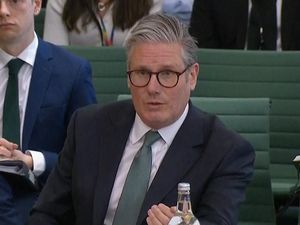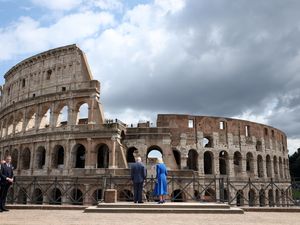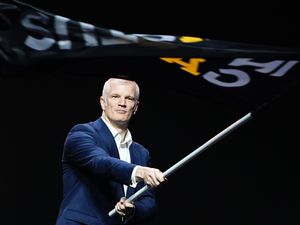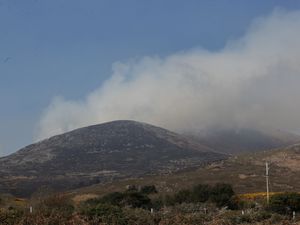UK to give up Chagos Islands sovereignty to secure future of military base
Conservatives reacted angrily, with Robert Jenrick saying there has been a ‘surrender’ and James Cleverly labelling the Government ‘weak’
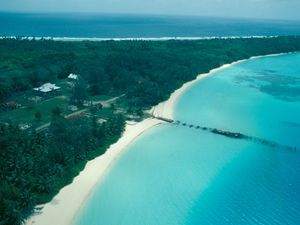
Britain is giving up sovereignty of a remote group of islands in return for securing the long-term future of a strategically important military base.
The UK Government said it has reached a political agreement with Mauritius over the Chagos Islands, also known as the British Indian Ocean Territory, following negotiations which began in 2022.
Mauritius will assume sovereignty over the Indian Ocean archipelago while the joint US-UK military base remains on Diego Garcia, the largest of the islands.
The Foreign Office said the agreement means the status of the base will be undisputed and legally secure.
US President Joe Biden welcomed the “historic” agreement and said it secures the “effective operation of the joint facility on Diego Garcia into the next century”.
But Conservative leadership candidates reacted angrily, with former foreign secretary James Cleverly labelling the Government “weak” and Robert Jenrick saying there has been a “surrender”.
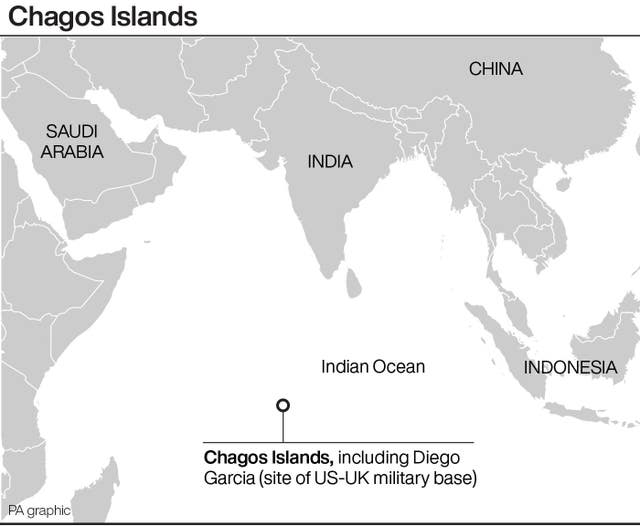
Chagossians were forced to leave the central Indian Ocean territory by 1973 to make way for the military base.
The expulsions are regarded as one of the most shameful parts of Britain’s modern colonial history and Chagossians have spent decades fighting to return to the islands.
The United Nations’ highest court, the International Court of Justice, previously ruled the UK’s administration of the territory was “unlawful” and must end.
Foreign Secretary David Lammy said: “This Government inherited a situation where the long-term, secure operation of the Diego Garcia military base was under threat, with contested sovereignty and ongoing legal challenges.
“Today’s agreement secures this vital military base for the future.
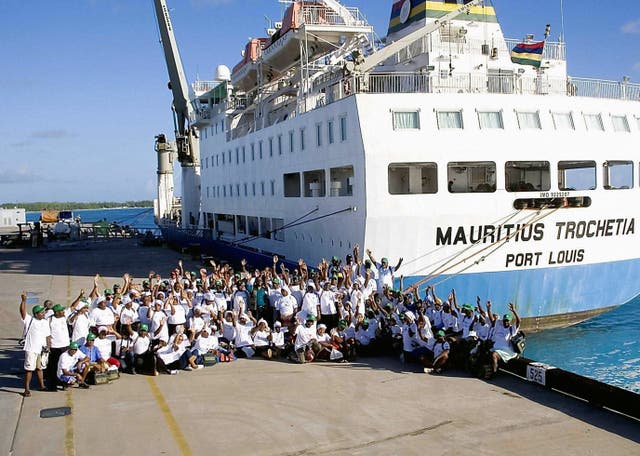
“It will strengthen our role in safeguarding global security, shut down any possibility of the Indian Ocean being used as a dangerous illegal migration route to the UK, as well as guaranteeing our long-term relationship with Mauritius, a close Commonwealth partner.”
The Foreign Office said the agreement is subject to a treaty and supporting legal instruments being finalised, adding that both sides have committed to complete this as quickly as possible.
A Downing Street spokesman said Prime Minister Sir Keir Starmer spoke to his Mauritius counterpart, Pravind Jugnauth, on Thursday morning.
The spokesman said: “The Prime Minister reiterated the importance of reaching this deal to protect the continued operation of the UK/US military base on Diego Garcia.
“He underscored his steadfast duty to national and global security which underpinned the political agreement reached today.”
The agreement on the continued UK-US military presence on Diego Garcia is expected to run for 99 years with an option to renew.
The UK will pay a regular annual sum of money during the agreement and there will be funding to help benefit Chagossians.
Overseas Territories minister Stephen Doughty refused to spell out how much the deal would cost the British taxpayer.
“Full details will be set out in due course,” he said. “We inherited a completely unsustainable situation, and we’re confident that we’ve achieved a deal here that’s both legally sustainable, that reaches a settlement that’s financially sustainable and crucially protects the national security interests of this country, and indeed our allies.”
A group of asylum seekers have been living on Diego Garcia since 2021 after they encountered difficulties while trying to travel by boat from Sri Lanka to Canada.
The British Indian Ocean Territory has been considering their claims for protection.
Mauritius would be responsible for any future arrivals under the new agreement.
A joint statement from the UK and Mauritius governments said the treaty will “address wrongs of the past and demonstrate the commitment of both parties to support the welfare of Chagossians”.
They also said the agreement will “herald a new era of economic, security and environmental partnership between our two nations”, adding: “To enable this partnership the UK will provide a package of financial support to Mauritius.
“This will include an indexed annual payment for the duration of the agreement and the establishment of a transformational infrastructure partnership, underpinned by UK grant funding, to deliver strategic projects generating meaningful change for ordinary Mauritians and boosting economic development across the country.”
Conservative former minister Mr Jenrick said: “It’s taken three months for Starmer to surrender Britain’s strategic interests.
“This is a dangerous capitulation that will hand our territory to an ally of Beijing.”
Mr Cleverly wrote on social media: “Weak, weak, weak! Labour lied to get into office. Said they’d be whiter than white, said they wouldn’t put up taxes, said they’d stand up to the EU, said that they be patriotic. All lies!”
Fellow Tory leadership candidate Tom Tugendhat said: “This is a shameful retreat undermining our security and leaving our allies exposed.”
He said the Foreign Office had “negotiated against Britain’s interest” and it is “disgraceful that these negotiations started under our watch”.
Kemi Badenoch, another Conservative former cabinet minister hoping to lead the party, said Labour has “put our vital base in the Indian Ocean at risk”.
She added: “Anyone who has been paying attention to the geopolitical climate will understand the strategic necessity of these islands.”
Jonathan Powell, the Prime Minister’s special envoy for negotiations between the UK and Mauritius, dismissed the “silly” Tory criticism of the deal and noted Mr Cleverly was leading the talks not too long ago.
Mr Powell said the previous Tory administration managed to “lose the trust” of their Mauritian counterparts, telling BBC Radio 4’s World At One programme: “So for the people who were involved in that negotiation to start criticising the outcome, something they couldn’t achieve, is absolutely ludicrous.”
He added: “They are criticising it because they want to try and score points in their desperate attempt to win the leadership.”

